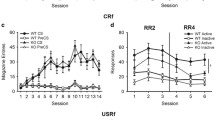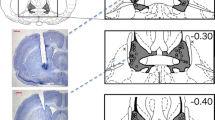Abstract
This experiment examined the effect of destroying the ascending 5-hydroxytryptaminergic (5-HTergic) pathways on timing and switching behaviour in the free-operant psychophysical procedure. Rats received injections of 5,7-dihydroxytryptamine into the dorsal and median raphe nuclei or sham lesions. They were trained to press levers for sucrose reinforcement; sessions consisted of fifty 50-s trials in which reinforcers were available on a variable-interval 30-s schedule. In the first 25 s, of each trial, reinforcement was only available for responses on lever A; in the last 25 s, it was available only for responses on lever B. In phase 1 (70 sessions) repetitive switching between the levers was prevented by withdrawal of lever A after the first response on lever B in each trial; in phase 2 (40 sessions) this constraint on switching was removed; in phase 3 (40 sessions) the constraint was reinstated. Data were collected from probe trials (four per session) in which no reinforcers were delivered, during the last ten sessions of each phase. In all phases, both groups showed declining response rates on lever A and increasing response rates on lever B as a function of time from the onset of the trial. Response rate on lever B, expressed as percentage of overall response rate, could be described by a two-parameter logistic function. Removal of the constraint on switching reduced the slope of the function without changing the indifference point (time corresponding to 50% responding on lever B). The parameters of the timing function did not differ between the groups in any of the phases. However, the lesioned group showed a greater enhancement of switching rate during phase 2 than the control group. The levels of 5-HT and 5-hydroxyindoleacetic acid were reduced in the brains of the lesioned rats, but the levels of noradrenaline and dopamine were not altered. The results provide further evidence for the involvement of the ascending 5-HTergic pathways in switching between response alternatives, but cast doubt on our previous suggestion that the effects of 5-HT depletion on temporal differentiation of behaviour are mediated by facilitated switching.
Similar content being viewed by others
Author information
Authors and Affiliations
Additional information
Received: 12 July 1998/Final version: 9 October 1998
Rights and permissions
About this article
Cite this article
Chiang, TJ., Al-Ruwaitea, A., Ho, MY. et al. Effect of central 5-hydroxytryptamine depletion on performance in the free-operant psychophysical procedure: facilitation of switching, but no effect on temporal differentiation of responding. Psychopharmacology 143, 166–173 (1999). https://doi.org/10.1007/s002130050932
Issue Date:
DOI: https://doi.org/10.1007/s002130050932




